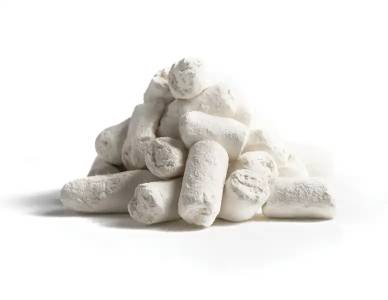Description
Kaolin Clay: A Versatile Natural Mineral for Skin, Art & Industry
Kaolin, also known as china clay, is a naturally occurring soft, earthy mineral composed primarily of hydrated aluminum phyllosilicate. Its unique properties make it a highly versatile ingredient used in a wide range of applications, from skincare and cosmetics to industrial processes. This detailed description explores the different grades and uses of this remarkable mineral.
Key Properties & Benefits:
- High Absorbency: Kaolin's porous structure allows it to absorb excess oil and impurities from the skin, making it ideal for oily and acne-prone complexions.
- Gentle Exfoliation: Its fine particles provide a mild, non-abrasive exfoliation, removing dead skin cells without causing irritation.
- Soothing & Calming: Kaolin possesses anti-inflammatory properties, helping to soothe irritated skin and reduce redness.
- Thickening & Binding Agent: In cosmetic formulations, it acts as a thickening and binding agent, creating smooth, creamy textures.
- High Brightness & Whiteness: This characteristic makes it valuable in papermaking, coatings, and other applications requiring a bright white finish.
- Low Shrinkage & Plasticity: These properties are crucial in ceramic and pottery applications.
Grades & Types:
Kaolin is available in various grades depending on its particle size, color, and purity. The most common types include:
- Cosmetic Grade: Finely ground and highly purified, this grade is specifically processed for use in skincare and cosmetic products. It's free from harmful contaminants and ensures gentle application.
- Industrial Grade: Used in a variety of industrial applications, this grade may have a wider particle size distribution and may contain trace amounts of other minerals. Specific properties are tailored to the intended use.
- Paper Coating Grade: This grade boasts high brightness and whiteness, providing excellent opacity and smoothness for paper coatings.
Applications:
Cosmetics & Skincare:
- Face Masks: A primary application, kaolin clay masks draw out impurities, leaving skin feeling clean, refreshed, and mattified.
- Cleansers: Incorporated into cleansers, it gently exfoliates and removes makeup while absorbing excess oil.
- Foundations & Powders: Used as a thickening agent and provides a smooth, matte finish.
- Other applications: Sunscreens, lotions, and other cosmetic formulations.
Industrial Applications:
- Ceramics & Pottery: A crucial ingredient in creating strong, durable ceramics and pottery.
- Paper Coating: Provides brightness, smoothness, and opacity to paper.
- Paints & Coatings: Acts as a filler and provides improved rheological properties.
- Pharmaceuticals: Used as a binder and filler in tablets and capsules.
- Rubber & Plastics: Acts as a filler and reinforcement agent.
Safety Precautions:
While generally considered safe, it's always recommended to perform a patch test before applying kaolin clay to the face or body, especially if you have sensitive skin. Avoid contact with eyes. In industrial settings, appropriate safety measures should be followed to prevent inhalation of dust.
Conclusion:
Kaolin clay is a remarkable natural mineral with a diverse range of applications, spanning from skincare to industrial processes. Its unique properties and versatility make it a valuable ingredient in numerous products and materials. The specific grade chosen will depend on the intended application.
